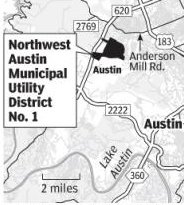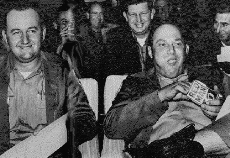|
Introduction
In the Civil
Rights Cases
(1883), the Supreme Court considered the constitutionality of a civil
rights
act, enacted eight years earlier, that was remarkably broad in
scope.
The 1875 act banned racial discrimination in many types of public
accomodations,
including hotels, railroad cars, theaters, and amusement parks.
If
the 1875 act had been upheld and enforced, the United States would have
had a much happier history. Not until 1964 would such sweeping
civil
rights legislation again make it through Congress. In the Civil
Rights Cases, the Court found that neither Section 2 of the 13th
Amendment
nor Section 5 of the 14th Amendment empowered Congress to ban private
discrimination.
Writing for the Court, Justice Bradley concluded that the
discrimination
in public accomodations had "nothing to do with slavery or involuntary
servitude" and therefore fell outside of the power granted Congress in
the 13th Amendment, while Section 5 of the 14th Amendment allowed
Congress
to regulate only discrimination in which the state was an actor.
In dissent, Justice John Harlan argued that the denial of equal public
accomodations constituted a "badge of slavery" that Congress could
prohibit
under its 13th Amendment power. Moreover, Harlan argued that with
respect to discrimination in public accomodations, the discriminating
individuals
or corporations acted as "agents of the state."
Jones vs
Alfred H.
Mayer Co. (1968) arose when the developer of a surburban St. Louis
subdivision refused to sell Joseph Jones a home because he was
black.
Jones sued the developer, alleging a violation of 42 U.S.C. 1982 which
granted "all citizens of the United States...the same right as is
enjoyed
by white citizens...to purchase...real property." The Court
rejected
the developer's argument that Congress lacked the power under Section 2
of the 13th Amendment to ban private discrimination in housing.
According
to the Court in Jones, so long as Congress could rationally
conclude
that private discrimination in the housing market was "a badge of
slavery,"
the statute should be upheld.
In South
Carolina vs
Katzenbach (1966), the Court considered a challenge to provisions
of
the 1965 Voting Rights Act. South Carolina objected to provisions
that required that South Carolina (and other southern states with small
percentages of of enrolled minority voters from among those eligible to
vote) to submit to the Attorney General for "preclearance" changes in
state
voting laws. The Court found the preclearance provision to be a
constitutional
exercise of the power of Congress under Section 2 of the 15th
Amendment.
The Court saw the power of Congress as broad enough to allow creation
of
specific mechanisms for carrying out the general prohibition (the ban
on
denying the vote on account of race) of the 15th Amendment.
Another
provision of the
1965 Voting Rights Act was at issue in Katzenbach v. Morgan.
The Court considered whether the Constitution gave Congress the power
to
ban literacy tests, a device long used to deny the vote to
non-whites.
Although the Court had previously determined literacy tests to not
violate
the Equal Protection Clause, the Court nonetheless founf that the power
of Congress under Section 5 of the 14th Amendment was broad enough to
authorize
the literacy test ban. The Court seemed to see Section 5 as
giving
Congress the power to add to--but not subtract from--protections that
the
Court finds contained in the 14th Amendment. A somewhat narrower
interpretation of Morgan is that the Court will defer to
findings
of Congress that purport to establish that an applicable legal standard
(relating, e.g., to equal protection) is met--even when deferring to
those
factual findings effectively overrules Supreme Court precedent.
In Oregon
v. Mitchell
(1970), the Court rejected some of the broad language of four years
earlier
in Morgan. The Court, in finding that Congress lacked the
power to compel states to guarantee persons over the age of eighteen to
vote in state elections, indicated that Section 5 of the 14th Amendment
does not give Congress the power to enforce a broader
interpretation
of the reach of the 14th Amendment than given by the Supreme
Court.
Because the Court found the denial of the vote to 18 to 20 years olds
not
to offend the Equal Protection Clause, Congress lacked the power under
Section 5 to legislatively mandate that states allow persons in that
age
group to vote. (The extension of the right to vote to
eighteen-year
olds in state elections was subsequently accomplished by the
ratification
of the 26th Amendment in 1971). Four dissenters argued that the
Court
was bound, under Morgan, to accept Congress's more generous
interpretations
of the reach of the 14th Amendment.
In U. S. v
Guest (1966),
the U. S. attorney in Georgia brought a prosecution under Section 241
of
the 1870 Civil Rights Act against persons for intimidating and filing
false
reports against blacks who attempted to integrate public
facilities.
Those charged argued that Section 241 (which made it illegal for two or
more persons to conspire to intimidate "any citizen in the free
exercise
of any right or privilege secured to him by the Constitution") reached
only state actors or, if it did intend to cover private actors, it was
outside of the power of Congress. On the issue of whether
the
Constitution gave Congress the power to reach private discrimination,
six
justices suggested that it did--implying that an overruling of the Civil
Rights Cases of 1883 was appropriate.
In City of
Rome v U.
S. (1980), the Court upheld a decision of the Justice Department to
reject a proposed change in Rome, Georgia's method of electing city
commissioners.
DOJ had rejected Rome's proposed change not based on any finding that
the
change was intended to discriminate against black voters, but because
it
had the discriminatory effect of making it more difficult for
black
candidates to be elected. Even though the Court's Equal
Protection
Clause jurisprudence teaches that the Clause prohibits only purposeful
discrimination, not actions with discriminatory effects, the Court
found
Congress to have been acting within its Section 2 of the the 15th
Amendment
powers. The Court said it would defer to the judgment of Congress
that because of past "ingenious defiance" of the right of black voters,
it might be necessary to focus on discriminatory effects to uphold "the
spirit" of the 15th Amendment. Justice Rehnquist, in his dissent,
contended that the DOJ's action was not a valid exercise of Congress's
Section 2 remedial powers.
Two more
recent Supreme
Court decisions illustrate the Court's trend of reigning in
congressional
power. In 1997, in City of Boerne v Flores, the
Court
ruled that Religious Freedom Restoration Act (an Act intended to
restrore
the "compelling state interest test" for evaluating Free Exercise
Clause
claims that the Court discarded in its 1990 decision, Employment
Division
v Smith) was unconstitutional, at least as applied to state and
local
governments. The Court concluded that the Constitution, and in
particular
Section 5 of the Fourteenth Amendment, gave no power to Congress to do
more than adopt remedial measures consistent with Fourteenth Amendment
interpretations of the Court, and that Congress had instead tried to
changed
the substantive law--substituting its interpretation of the Free
Exercise
Clause for that of the Supreme Court. Finally, in U. S. vs
Morrison
(2000), invalidating the Violence Against Women Act's authorization
of private federal suits for gender-motivated assaults, the Court held
that Section 5 of the 14th Amendment--contrary to the suggestion of six
justices in Guest--gave Congress no power to reach private
discrimination.

George Lane, the plaintiff who sued Tennessee for
violating the ADA
(photo: ABA Journal)
Tennessee v. Lane (2004) reflects,
primarily, the concerns of one justice (O'Connor) about going too far
in the direction of restricting Congress's ability to deal with action
(and inaction) by states that might be preventing citizens from fully
exercising rights guaranteed by the Fourteenth Amendment. Justice
O'Connor provided the deciding fifth vote to uphold, as a valid
exercise of Congress's powers under Section 5 of the Fourteenth
Amendment, provisions in Article II of the Americans with Disabilities
Act that allowed citizens to sue states that failed to provide adequate
access for disabled citizens to courtrooms. The Court determined
that denials of the right of access to state courts triggered strict
scrutiny under the Due Process Clause of the Fourteenth Amendment
(incorporation of the Confrontation Clause of the Sixth amendment,
right of defendant to be present at his trial, right for a "meaningful
opportunity to be heard," incorporation of the press's First Amendment
right to report trial proceedings) and therefore the provisions of the
ADA constituted "reasonable prophylactic remedial legislation" within
the power of Congress to adopt. In an interesting dissent,
Justice Scalia announced that he regretted ever suggesting that the
Congress had power under Section 5 to enact prophylactic legislation,
and henceforward he would only recognize--except, for stare decisis
reasons, with respect to racial discrimination--the power of Congress
to "enforce" the provisions of the Fourteenth Amendment.
Cases Defining the power to
enforce
the protections
of the 13th, 14th, and 15th Amendments:
Jones
vs Alfred H. Mayer Co. (1968)
South
Carolina vs Katzenbach (1966)
Katzenbach
vs Morgan (1966)
Oregon
vs Mitchell (1970)
U.
S. vs Guest (1966)
Rome
vs U. S. (1980)
City
of Boerne vs Flores (1997)
U.
S. vs Morrison (2000)
Tennessee v Lane
(2004)
|
|
Constitutional Grants of Powers
to Congress under
the Civil War Amendments
AMENDMENT XIII
Passed by
Congress January 31,
1865. Ratified December 6, 1865.
Section 1.
Neither slavery nor involuntary
servitude,
except as a punishment for crime whereof the party shall have been duly
convicted, shall exist within the United States, or any place subject
to
their jurisdiction.
Section
2.
Congress
shall have
power to enforce this article by appropriate legislation.
AMENDMENT XIV
Passed by
Congress June 13, 1866.
Ratified July 9, 1868.
Section 1.
All persons born or naturalized
in the
United States, and subject to the jurisdiction thereof, are citizens of
the United States and of the State wherein they reside. No State shall
make or enforce any law which shall abridge the privileges or
immunities
of citizens of the United States; nor shall any State deprive any
person
of life, liberty, or property, without due process of law; nor deny to
any person within its jurisdiction the equal protection of the
laws.
Section 2-4
[omitted].
Section
5.
The
Congress shall
have the power to enforce, by appropriate legislation, the provisions
of
this article.
AMENDMENT XV
Passed by
Congress February 26,
1869. Ratified February 3, 1870.
Section 1.
The right of citizens of the
United States
to vote shall not be denied or abridged by the United States or by any
State on account of race, color, or previous condition of
servitude.
Section
2.
The
Congress shall
have the power to enforce this article by appropriate legislation.
|

Northwest Austin Municipal Utility
District v Mukasey (2009)
In January 2009, the
Supreme Court granted cert in a case testing the power of Congress to
extend the "preclearance" provisions (Section 5) of the Voting Rights
Act of 1965 for an additional 25 years. The provision in question
requires that federal permission be given before election procedure
changes can go into effect in jurisdictions with a previous history of
disenfranchising minority voters. The appeal argues that the
extension cannot be applied to the Texas sewer district in question
given "the utter absence of any present-day pattern of unconstitutional
voting-rights deprivations of the type Section 5 was originally
designed to address." Supporters of the extension argue that
Congress has the power to enact laws to deter voting rights violations,
and that the Texas district is "trying to blame Section 5 for its own
success."
|
Questions
1. What would seem to be a better basis for upholding the
public accomodations
provisions of civil rights laws, the Commerce Clause or the enforcement
powers granted to Congress in the Civil War amendments?
2. It has been suggested that holding private discrimination
outside the reach of the federal government serves several values: it
enhances
individual liberty (the choice of individuals not to associate
with
other individuals is respected), it reinforces pluralism and the
principle
of federalism. What do you think of these arguments?
3. The 13th Amendment is unique in that by its own words it
applies
to private individuals as well as government. How far does Section 2 of
the 13th Amendment go in allowing Congress to reach forms of private
discrimination?
If discrimination in housing can be "a badge of slavery," might also
discrimination
in the membership policies of a private club? How does one
determine
what is or is not a "badge of slavery" reachable by Section 2 of the
13th
Amendment?
4. In South Carolina v Katzenbach the Court says it will
determine only whether Congress has chosen a "rational" means of
enforcing
its 15th Amendment powers. Do you agree that is the proper test?
5. Katzenbach v Morgan suggests that Congress should be
given the latitude to enforce a broader interpretation of the reach of
the 14th Amendment than the Supreme Court has provided--Congress may
add
to, but not subtract from, the 14th Amendment rights recognized by the
Court. Is this a sound view of Congress's 14th Amendment power,
or
do you favor the more restrictive interpretation adopted in the more
recent
cases of City of Boerne and Morrison? Why?
6. What if Congress, contrary to the Court's holding in Roe
v Wade, took the view that a fetus is "a person" for 14th Amendment
purposes and, on that basis, prohibited states from enforcing laws
authorizing
abortions? Under the theory of Katzenbach v Morgan, would
that be a valid exercise of Congress's 14th Amendment power? Why
not?
7. Robert Bork labeled Morgan "a revolutionary
constitutional
doctrine." He argued that it might authorize Congress to overturn
any
state law by simply finding that a state legislative classification
violated
the Equal Protection Clause? Is he right?
8. If, in Oregon v Mitchell, the Court had upheld the
federal law guaranteeing the right of eighteen-year-olds to vote in
state
elections, would logic have compelling the Court to also uphold a
federal
law giving the vote to seven-year-olds?
9. Is Oregon v Mitchell consistent with Katzenbach
v Morgan?
10. Should U. S. v Guest be seen as overruling the Civil
Rights Cases of 1883 on the question of whether the 14th Amendment
allows Congress to ban private discrimination?
11. Do you agree that it might be necessary to ban changes in
voting laws that have discriminatory effects on a racial group in order
to enforce the constitutional right of members of a racial group of not
being purposefully denied the right to vote?
12. Might the "compelling state interest" test of the Religious
Freedom Restoration Act struck down as applied to states in City of
Boerne still apply in cases where the free exercise of religion
claim
is asserted against federal authorities? What power in
the
Constitution might support this provision of RFRA?
13. Might Congress validly allow disabled citizens to sue states
for denial of adequate access to state facilities other than the
courtrooms involved in Tennessee v
Lane? What about voting booths? Jail
facilities? Legislative chambers and hearing rooms? Sports
arenas? Is this facility-by-facility analysis of the reach of
Congressional power justitied by the language of the Fourteenth
Amendment?
14. What do you think of Justice Scalia's opinion, expressed in
his dissent in Tennessee v Lane,
that the Court was wrong to suggest that Congress's powers under
Section 5 of the Fourteenth Amendment ever extended beyond the power to
"enforce" rights actually guaranteed by the Amendment (not those
actions that merely threaten
rights)?

Deputy Sheriff Cecil Price and Sheriff
Lawrence Rainey
at arraignment
The Price ("Mississippi Burning") Case
In United States v Price et al (1966),
the Supreme
Court found that Congress, in the 1866 Civil Rights Act, reached
private
actors acting in concert with state officials to deprive persons of
their
constitutional rights. The Court overturned a decision throwing
out
the federal indictments brought against KKK members who participated
with
county officials in murdering three civil rights workers near
Philadelphia,
Mississippi in 1964. To read more about this fascinating case:
The
Mississippi Burning Trial
|
|



